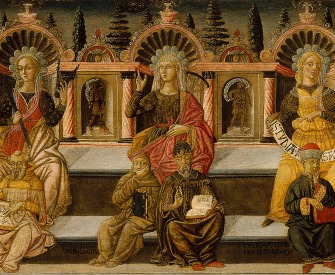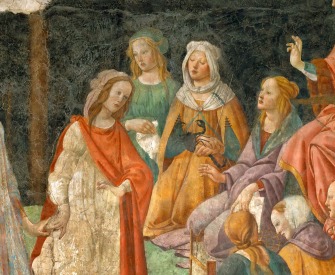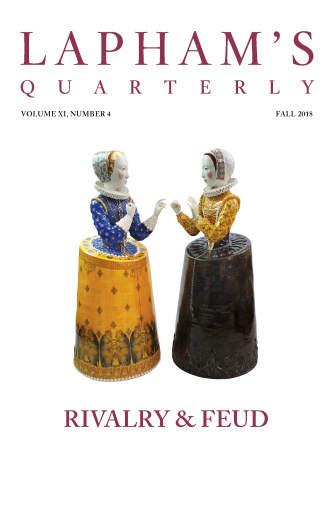Undine lay silent, her hands clasped behind her head. She was plunged in one of the moods of bitter retrospection when all her past seemed like a long struggle for something she could not have, from a trip to Europe to an opera box; and when she felt sure that, as the past had been, so the future would be. And yet, as she had often told her parents, all she sought for was improvement: she honestly wanted the best.
Her first struggle—after she had ceased to scream for candy or sulk for a new toy—had been to get away from Apex in summer. Her summers, as she looked back on them, seemed to typify all that was dreariest and most exasperating in her life. The earliest had been spent in the yellow “frame” cottage where she had hung on the fence, kicking her toes against the broken palings and exchanging moist chewing gum and half-eaten apples with Indiana Frusk. Later on, she had returned from her boarding school to the comparative gentility of summer vacations at the Mealey House, whither her parents, forsaking their squalid suburb, had moved in the first flush of their rising fortunes. The tessellated floors, the plush parlours and organ-like radiators of the Mealey House had, aside from their intrinsic elegance, the immense advantage of lifting the Spraggs high above the Frusks, and making it possible for Undine, when she met Indiana in the street or at school, to chill her advances by a careless allusion to the splendors of hotel life. But even in such a setting, and in spite of the social superiority it implied, the long months of the middle western summer, fly-blown, torrid, exhaling stale odors, soon became as insufferable as they had been in the little yellow house. At school Undine met other girls whose parents took them to the Great Lakes for August; some even went to California, others—oh bliss ineffable!—went “east.”
Pale and listless under the stifling boredom of the Mealey House routine, Undine secretly sucked lemons, nibbled slate pencils, and drank pints of bitter coffee to aggravate her look of ill-health; and when she learned that even Indiana Frusk was to go on a month’s visit to Buffalo, it needed no artificial aids to emphasize the ravages of envy. Her parents, alarmed by her appearance, were at last convinced of the necessity of change, and timidly, tentatively, they transferred themselves for a month to a staring hotel on a glaring lake.
There Undine enjoyed the satisfaction of sending ironic postcards to Indiana and discovering that she could more than hold her own against the youth and beauty of the other visitors. Then she made the acquaintance of a pretty woman from Richmond whose husband, a mining engineer, had brought her west with him while he inspected the newly developed Eubaw mines; and the Southern visitor’s dismay, her repugnances, her recoil from the faces, the food, the amusements, the general bareness and stridency of the scene, were a terrible initiation to Undine. There was something still better beyond, then—more luxurious, more exciting, more worthy of her! She once said to herself, afterward, that it was always her fate to find out just too late about the “something beyond.” But in this case it was not too late—and obstinately, inflexibly, she set herself to the task of forcing her parents to take her “east” the next summer.
Yielding to the inevitable, they suffered themselves to be impelled to a Virginia “resort” where Undine had her first glimpse of more romantic possibilities—leafy moonlight rides and drives, picnics in mountain glades, and an atmosphere of Christmas-chromo sentimentality that tempered her hard edges a little and gave her glimpses of a more delicate kind of pleasure. But here again everything was spoiled by a peep through another door. Undine, after a first mustering of the other girls in the hotel, had, as usual, found herself easily first—till the arrival, from Washington, of Mr. and Mrs. Wincher and their daughter. Undine was much handsomer than Miss Wincher, but she saw at a glance that she did not know how to use her beauty as the other used her plainness. She was exasperated, too, by the discovery that Miss Wincher seemed not only unconscious of any possible rivalry between them, but actually unaware of her existence. Listless, long-faced, supercilious, the young lady from Washington sat apart reading novels or playing solitaire with her parents as though the huge hotel’s loud life of gossip and flirtation were invisible and inaudible to her. Undine never even succeeded in catching her eye: she always lowered it to her book when the Apex beauty trailed or rattled past her secluded corner. But one day an acquaintance of the Winchers’ turned up—a lady from Boston who had come to Virginia on a botanizing tour; and from scraps of Miss Wincher’s conversation with the newcomer, Undine, straining her ears behind a column of the long veranda, obtained a new glimpse into the unimagined.
The Winchers, it appeared, found themselves at Potash Springs merely because a severe illness of Mrs. Wincher’s had made it impossible, at the last moment, to move her farther from Washington. They had let their house on the North Shore, and, as soon as they could leave “this dreadful hole,” were going to Europe for the autumn. Miss Wincher simply didn’t know how she got through the days, though no doubt it was as good as a rest-cure after the rush of the winter. Of course they would have preferred to hire a house, but the “hole,” if one could believe it, didn’t offer one, so they had simply shut themselves off as best they could from the “hotel crew”—had her friend, Miss Wincher parenthetically asked, happened to notice the Sunday young men? They were queerer even than the “belles” they came for—and had escaped the promiscuity of the dinner hour by turning one of their rooms into a dining room, and picnicking there—with the Persimmon House standards, one couldn’t describe it in any other way! But luckily the awful place was doing mamma good, and now they had nearly served their term….
Undine turned sick as she listened. Only the evening before she had gone on a “buggy ride” with a young gentleman from Deposit—a dentist’s assistant—and had let him kiss her and given him the flower from her hair. She loathed the thought of him now; she loathed all the people about her, and most of all the disdainful Miss Wincher. It enraged her to think that the Winchers classed her with the “hotel crew”—with the “belles” who awaited their Sunday young men. The place was forever blighted for her, and the next week she dragged her amazed but thankful parents back to Apex.
But Miss Wincher’s depreciatory talk had opened ampler vistas, and the pioneer blood in Undine would not let her rest. She had heard the call of the Atlantic seaboard, and the next summer found the Spraggs at Skog Harbor, Maine. Even now Undine felt a shiver of boredom as she recalled it. That summer had been the worst of all. The bare wind-beaten inn, all shingles without and blueberry pie within, was “exclusive,” parochial, Bostonian; and the Spraggs wore through the interminable weeks in blank unmitigated isolation. The incomprehensible part of it was that every other woman in the hotel was plain, dowdy, or elderly—and most of them all three. If there had been any competition on ordinary lines, Undine would have won, as Van Degen said, “hands down.” But there wasn’t—the other “guests” simply formed a cold impenetrable group who walked, boated, played golf, and discussed Christian Science and the Subliminal, unaware of the tremulous organism drifting helplessly against their rock-bound circle.
It was on the day the Spraggs left Skog Harbor that Undine vowed to herself with set lips, “I’ll never try anything again till I try New York.” Now she had gained her point and tried New York, and so far, it seemed, with no better success. From small things to great, everything went against her. In such hours of self-searching she was ready enough to acknowledge her own mistakes, but they exasperated her less than the blunders of her parents. She was sure, for instance, that she was on what Mrs. Heeny called “the right tack” at last.
From The Custom of the Country. Herself a member of the American upper class who was tutored in Europe for six years after the Civil War, Wharton was never at home in the manor in which she was born. In 1906, at the age of forty-four, having made in America a failed marriage and a brilliant literary success, she moved to France, where she lived until her death in 1937.
Back to Issue





